|
Global equities slumped last week as investor angst resurfaced about the situation with Greece as well as the issues with Spain and Italy. Concerns were heightened by disappointing data from China and indications that global economic growth continues to slow. Most indexes tracked here were down on the week. The exceptions were the Sensex (up 0.5 percent), the SET (up 1.1 percent) and the Taiex (up 0.1 percent). Declines ranged from 0.1 percent (S&P/TSX Composite) to 3.0 percent (OMX Stockholm 30) and 3.3 percent (IBEX).
 Flash PMI indexes indicated that business activity in the Eurozone contracted at a sharp pace in August. The data show that the Eurozone could be headed for a second recession in three years and suggest that economic weakness will continue to complicate efforts by the European Union to deal with the debt crisis. At the same time, the data add to pressures on the European Central Bank to stimulate activity through lower interest rates and purchases of government bonds of struggling euro members such as Spain and Italy. Flash PMI indexes indicated that business activity in the Eurozone contracted at a sharp pace in August. The data show that the Eurozone could be headed for a second recession in three years and suggest that economic weakness will continue to complicate efforts by the European Union to deal with the debt crisis. At the same time, the data add to pressures on the European Central Bank to stimulate activity through lower interest rates and purchases of government bonds of struggling euro members such as Spain and Italy.
Markit Economics purchasing managers' index for both manufacturing and services was 46.6, which is up slightly from July but still well below the breakeven threshold of 50 between expansion and contraction. Activity contracted in both France and Germany.
Markit compiles flash reports, which are manufacturing only, for the U.S. and China. In China, the manufacturing PMI slumped sharply in the August reading, offering one of the earliest glimpses of how the month has been progressing. HSBC's rival purchasing managers’ index sagged to 47.8 from 49.3 in July, the lowest level since late last year. The Chinese economy has been languishing for months with its domestic performance undermined by weakness in the important property sector while its export sector has been hit by sagging demand from overseas. In contrast, the U.S. flash manufacturing index improved over its July reading to 51.9 from 51.4. The good news here was that the report is led by acceleration in new orders which were up 1.6 points to 52.6.
|
|
2011 |
2012 |
% Change |
|
Index |
Dec 30 |
Aug 17 |
Aug 24 |
Week |
Year |
| Asia/Pacific |
|
|
|
|
|
|
| Australia |
All Ordinaries |
4111 |
4393.8 |
4376.5 |
-0.4% |
6.5% |
| Japan |
Nikkei 225 |
8455.35 |
9162.5 |
9070.8 |
-1.0% |
7.3% |
| Hong Kong |
Hang Seng |
18434.39 |
20116.1 |
19880.0 |
-1.2% |
7.8% |
| S. Korea |
Kospi |
1825.74 |
1946.5 |
1919.8 |
-1.4% |
5.2% |
| Singapore |
STI |
2646.35 |
3062.1 |
3050.5 |
-0.4% |
15.3% |
| China |
Shanghai Composite |
2199.42 |
2114.9 |
2092.1 |
-1.1% |
-4.9% |
|
|
|
|
|
|
|
| India |
Sensex 30 |
15454.92 |
17691.1 |
17783.2 |
0.5% |
15.1% |
| Indonesia |
Jakarta Composite |
3821.99 |
4160.5 |
4145.4 |
-0.4% |
8.5% |
| Malaysia |
KLCI |
1530.73 |
1649.8 |
1648.2 |
-0.1% |
7.7% |
| Philippines |
PSEi |
4371.96 |
5206.8 |
5143.4 |
-1.2% |
17.6% |
| Taiwan |
Taiex |
7072.08 |
7467.9 |
7477.5 |
0.1% |
5.7% |
| Thailand |
SET |
1025.32 |
1223.9 |
1237.2 |
1.1% |
20.7% |
|
|
|
|
|
|
|
| Europe |
|
|
|
|
|
|
| UK |
FTSE 100 |
5572.28 |
5852.4 |
5776.6 |
-1.3% |
3.7% |
| France |
CAC |
3159.81 |
3488.4 |
3433.2 |
-1.6% |
8.7% |
| Germany |
XETRA DAX |
5898.35 |
7040.9 |
6971.1 |
-1.0% |
18.2% |
| Italy |
FTSE MIB |
15089.74 |
15124.7 |
14880.7 |
-1.6% |
-1.4% |
| Spain |
IBEX 35 |
8566.3 |
7561.0 |
7310.3 |
-3.3% |
-14.7% |
| Sweden |
OMX Stockholm 30 |
987.85 |
1091.5 |
1058.6 |
-3.0% |
7.2% |
| Switzerland |
SMI |
5936.23 |
6529.3 |
6475.9 |
-0.8% |
9.1% |
|
|
|
|
|
|
|
| North America |
|
|
|
|
|
|
| United States |
Dow |
12217.56 |
13275.20 |
13158.0 |
-0.9% |
7.7% |
|
NASDAQ |
2605.15 |
3076.6 |
3069.8 |
-0.2% |
17.8% |
|
S&P 500 |
1257.6 |
1418.2 |
1411.1 |
-0.5% |
12.2% |
| Canada |
S&P/TSX Comp. |
11955.09 |
12089.9 |
12082.2 |
-0.1% |
1.1% |
| Mexico |
Bolsa |
37077.52 |
40547.5 |
40211.4 |
-0.8% |
8.5% |
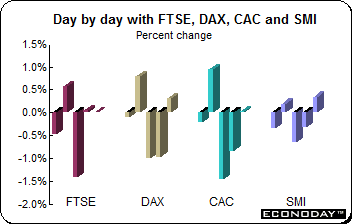 European stock markets retreated during the week as investors grew jittery ahead of a series of scheduled meetings between Greece's prime minister and European leaders. Greek Prime Minister Antonis Samaras first met Eurogroup chief Jean-Claude Juncker late Wednesday afternoon, followed on Friday by a meeting with German Chancellor Angela Merkel. On Saturday, Mr. Samaras was slated to meet with French President François Hollande. At issue is whether Greece has done enough to receive its next tranche of bailout money. The prime minister has called for more time to implement austerity measures and told a German daily newspaper that Greece needs some "breathing space" to revive the economy. The meeting between Samaras and Merkel resulted in no decision regarding an extension for Greece to implement reforms. European stock markets retreated during the week as investors grew jittery ahead of a series of scheduled meetings between Greece's prime minister and European leaders. Greek Prime Minister Antonis Samaras first met Eurogroup chief Jean-Claude Juncker late Wednesday afternoon, followed on Friday by a meeting with German Chancellor Angela Merkel. On Saturday, Mr. Samaras was slated to meet with French President François Hollande. At issue is whether Greece has done enough to receive its next tranche of bailout money. The prime minister has called for more time to implement austerity measures and told a German daily newspaper that Greece needs some "breathing space" to revive the economy. The meeting between Samaras and Merkel resulted in no decision regarding an extension for Greece to implement reforms.
Chancellor Merkel on Friday reiterated her support for Greece, saying she wants the country to remain in Eurozone. Merkel said Germany would wait till the troika report is released in September to assess the efforts undertaken by the Greek government to meet its fiscal targets. However, the Bundesbank continues to hold to the opinion that government bond purchases by the Eurosystem entail significant stability risks. The new program “could be unlimited” and decisions about potentially far greater sharing of solvency risks should be taken by governments or parliaments, not by central banks, it said in its monthly report.
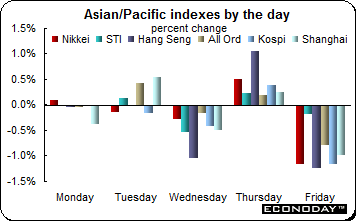 Equities here declined last week in thin trading on a combination of worries — weakening global growth as magnified by the flash PMI data from Europe and China and continuing debt woes in the Eurozone. In addition, investors fretted that U.S. stimulus hopes were fading after a Fed official said further action to boost the U.S. economy may not be necessary in the recent wake of some mildly encouraging data. Equities here declined last week in thin trading on a combination of worries — weakening global growth as magnified by the flash PMI data from Europe and China and continuing debt woes in the Eurozone. In addition, investors fretted that U.S. stimulus hopes were fading after a Fed official said further action to boost the U.S. economy may not be necessary in the recent wake of some mildly encouraging data.
The Shanghai Composite declined 1.1 percent on the week to a more than three year low on concerns over slowing growth both domestically and abroad. The All Ordinaries, down 0.4 percent, was also weighed down by weak global manufacturing data, more uncertainty in Europe and fading hopes for U.S. stimulus. Concerns about the end to the country’s mining boom also weighed on investors. After two weeks of healthy gains, the Nikkei was down 1.0 percent on growth worries. The exploding merchandise trade deficit added downward pressure.
The Reserve Bank of Australia released the minutes of its August 7th. At that time they kept the policy interest rate at 3.5 percent where it has been since June. In short, the minutes provided little new insights since the Statement on Monetary Policy which was released three days after the meeting. There was no discussion about cutting the cash rate, with the board judging again that the stance of monetary policy remained appropriate. Members noted that inflation data for the June quarter were broadly in line with expectations but was forecast to increase a little as the effects of earlier appreciation in the Australian dollar wane. They also noted that inflation would be temporarily pushed higher by the introduction of the carbon price but would be around the middle of the target range by late 2013 and would be "consistent" with the target over the medium term.
In his semiannual testimony at parliament later in the week, RBA Governor Glenn Stevens said policy makers are prepared to respond in the event the economy slows, predicting the nation’s mining investment boom has at least another year before easing: “The peak of the resource investment boom as a share of gross domestic product, the highest such peak in at least a century, will occur within the next year or two.” The RBA is ready to act if growth veers off from the outlook, he said.
Australia’s economy and currency have been bolstered in recent years by the biggest resources bonanza since a gold rush in the 1850s as Chinese-led demand for iron ore, coal and natural gas brought investment projects the government estimated to be worth A$500 billion. Steven’s comments on the timing of the resource investment peak contrast with Australian Resources Minister Martin Ferguson, who said the mining boom has ended.
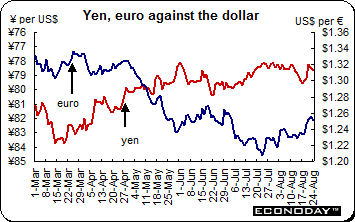 The euro had its largest weekly gain against the dollar in six months after the minutes of the July 31st to August 1st FOMC meeting signaled that the committee discussed further stimulus should the economy weaken and amid growing optimism Europe’s leaders will contain the ongoing crisis. The euro gained for a second week after German Chancellor Angela Merkel said she wants Greece to stay in the monetary union and that her nation is ready to help the Greek government take the needed steps to resolve its economic woes. However, the euro snapped four days of gains Friday after European Central Bank President Mario Draghi’s plan to buy government bonds was said to be held up pending a German court ruling. The court is expected to rule on September 12th. The euro had its largest weekly gain against the dollar in six months after the minutes of the July 31st to August 1st FOMC meeting signaled that the committee discussed further stimulus should the economy weaken and amid growing optimism Europe’s leaders will contain the ongoing crisis. The euro gained for a second week after German Chancellor Angela Merkel said she wants Greece to stay in the monetary union and that her nation is ready to help the Greek government take the needed steps to resolve its economic woes. However, the euro snapped four days of gains Friday after European Central Bank President Mario Draghi’s plan to buy government bonds was said to be held up pending a German court ruling. The court is expected to rule on September 12th.
Selected currencies — weekly results
|
|
2011 |
2012 |
% Change |
|
|
Dec 30 |
Aug 17 |
Aug 24 |
Week |
2012 |
| U.S. $ per currency |
|
|
|
|
|
|
| Australia |
A$ |
1.023 |
1.042 |
1.040 |
-0.1% |
1.7% |
| New Zealand |
NZ$ |
0.778 |
0.807 |
0.811 |
0.5% |
4.2% |
| Canada |
C$ |
0.982 |
1.011 |
1.008 |
-0.3% |
2.7% |
| Eurozone |
euro (€) |
1.294 |
1.233 |
1.251 |
1.5% |
-3.3% |
| UK |
pound sterling (£) |
1.554 |
1.569 |
1.581 |
0.8% |
1.8% |
|
|
|
|
|
|
|
| Currency per U.S. $ |
|
|
|
|
|
|
| China |
yuan |
6.295 |
6.360 |
6.356 |
0.1% |
-1.0% |
| Hong Kong |
HK$* |
7.767 |
7.757 |
7.757 |
0.0% |
0.1% |
| India |
rupee |
53.065 |
55.685 |
55.395 |
0.5% |
-4.2% |
| Japan |
yen |
76.975 |
79.550 |
78.670 |
1.1% |
-2.2% |
| Malaysia |
ringgit |
3.168 |
3.132 |
3.101 |
1.0% |
2.2% |
| Singapore |
Singapore $ |
1.297 |
1.254 |
1.258 |
-0.4% |
3.1% |
| South Korea |
won |
1152.450 |
1134.970 |
1134.580 |
0.0% |
1.6% |
| Taiwan |
Taiwan $ |
30.279 |
30.008 |
29.962 |
0.2% |
1.1% |
| Thailand |
baht |
31.580 |
31.500 |
31.210 |
0.9% |
1.2% |
| Switzerland |
Swiss franc |
0.939 |
0.974 |
0.960 |
1.5% |
-2.1% |
| *Pegged to U.S. dollar |
|
|
|
|
|
|
| Source: Bloomberg |
|
|
|
|
|
|
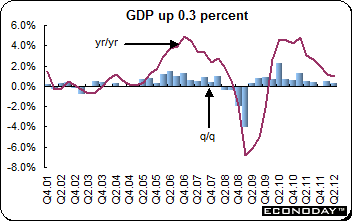 Second quarter gross domestic product was up an unrevised at 0.3 percent from the flash estimate and down from the 0.5 percent rate in the first quarter. Annual workday adjusted growth was similarly unmodified from the flash at 1.0 percent and down from 1.2 percent from the previous quarter. Foreign trade contributed a smaller 0.3 percentage point gain to second quarter grow as exports were up 2.5 percent on the quarter after a downwardly revised 1.2 percent increase in the previous quarter. Imports were up 2.1 percent after slipping 0.2 percent. Private consumption was up 0.4 percent, adding 0.2 percentage point to growth, gaining momentum after a downwardly revised 0.1 percent in the previous quarter. Public spending was up 0.2 percent for a second quarter. Investment once again was the main drag on second quarter growth. Total investment was down 1.8 percent — the largest quarterly fall since 3Q 2011, and cut 0.3 percentage point from GDP growth. Total domestic demand as a result slipped 0.1 percent on the quarter. Second quarter gross domestic product was up an unrevised at 0.3 percent from the flash estimate and down from the 0.5 percent rate in the first quarter. Annual workday adjusted growth was similarly unmodified from the flash at 1.0 percent and down from 1.2 percent from the previous quarter. Foreign trade contributed a smaller 0.3 percentage point gain to second quarter grow as exports were up 2.5 percent on the quarter after a downwardly revised 1.2 percent increase in the previous quarter. Imports were up 2.1 percent after slipping 0.2 percent. Private consumption was up 0.4 percent, adding 0.2 percentage point to growth, gaining momentum after a downwardly revised 0.1 percent in the previous quarter. Public spending was up 0.2 percent for a second quarter. Investment once again was the main drag on second quarter growth. Total investment was down 1.8 percent — the largest quarterly fall since 3Q 2011, and cut 0.3 percentage point from GDP growth. Total domestic demand as a result slipped 0.1 percent on the quarter.
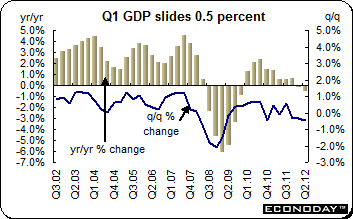 Second quarter gross domestic product declined a revised 0.5 percent, an improvement from the provisional reading of 0.7 percent. GDP was down 0.7 percent on the year. Second quarter data were affected by the Queen's Jubilee and poor weather. The main reasons for the upward revisions were stronger than expected performances of the construction and production sectors. Household expenditures were down 0.4 percent after a 0.1 percent drop in the first quarter. On the year, household spending dropped 0.8 percent. Business investment was down 1.5 percent on the quarter, cutting GDP quarterly growth by 0.1 percentage point. The only major upward impact on GDP came from inventories which were up sharply in Q2. Excluding the alignment adjustment these added 0.5 percentage point to GDP growth, the most since Q3 2011. This seems likely to be due to weaker demand than expected rather than pointing to firms expecting to see future demand increasing. The largest drag on growth came from net exports which cut quarterly GDP growth by 1 percentage point. On an output basis, services slipped 0.1 percent on the quarter while construction was revised up to show a decline of 3.9 percent from an initially estimated 5.2 percent drop. Industrial production declined 0.9 percent on the quarter, in contrast to the initially estimated 1.3 percent slide. Second quarter gross domestic product declined a revised 0.5 percent, an improvement from the provisional reading of 0.7 percent. GDP was down 0.7 percent on the year. Second quarter data were affected by the Queen's Jubilee and poor weather. The main reasons for the upward revisions were stronger than expected performances of the construction and production sectors. Household expenditures were down 0.4 percent after a 0.1 percent drop in the first quarter. On the year, household spending dropped 0.8 percent. Business investment was down 1.5 percent on the quarter, cutting GDP quarterly growth by 0.1 percentage point. The only major upward impact on GDP came from inventories which were up sharply in Q2. Excluding the alignment adjustment these added 0.5 percentage point to GDP growth, the most since Q3 2011. This seems likely to be due to weaker demand than expected rather than pointing to firms expecting to see future demand increasing. The largest drag on growth came from net exports which cut quarterly GDP growth by 1 percentage point. On an output basis, services slipped 0.1 percent on the quarter while construction was revised up to show a decline of 3.9 percent from an initially estimated 5.2 percent drop. Industrial production declined 0.9 percent on the quarter, in contrast to the initially estimated 1.3 percent slide.
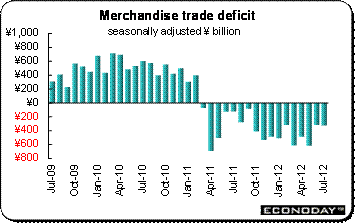 July unadjusted merchandise trade deficit was a much greater than expected Y517.4 billion. Analysts expected a deficit of Y300 billion. Exports sank 8.1 percent from a year ago – expectations were for a decline of 3 percent. Imports were up 2.1 percent rather than the 3.2 percent expected. From a year ago, exports dropped to all of its major trading partners with the exception of the U.S. Exports to the EU plummeted 25.1 percent and sank 11.9 percent to China. The drop to the EU was the 11th consecutive drop while it was the second decline to China. Exports to Asia declined for the second month and were down 9.0 percent on the year. However, exports to the U.S. were up 4.7 percent from July 2011 for the ninth consecutive increase thanks mostly to autos. On a seasonally adjusted basis, the trade deficit was Y325.7 billion after Y317.6 billion in June. The trade balance has been in deficit since March 2011 on an adjusted basis. Exports dropped 1.1 percent on the month and 4.8 percent from a year ago. Imports sank 0.9 percent and 1.2 percent on the year. The trade figures clearly underline the weakness in the global economy. The deficit continues to reflect high imports of oil and gas which have been used to make up for the reduced usage of nuclear generation. July unadjusted merchandise trade deficit was a much greater than expected Y517.4 billion. Analysts expected a deficit of Y300 billion. Exports sank 8.1 percent from a year ago – expectations were for a decline of 3 percent. Imports were up 2.1 percent rather than the 3.2 percent expected. From a year ago, exports dropped to all of its major trading partners with the exception of the U.S. Exports to the EU plummeted 25.1 percent and sank 11.9 percent to China. The drop to the EU was the 11th consecutive drop while it was the second decline to China. Exports to Asia declined for the second month and were down 9.0 percent on the year. However, exports to the U.S. were up 4.7 percent from July 2011 for the ninth consecutive increase thanks mostly to autos. On a seasonally adjusted basis, the trade deficit was Y325.7 billion after Y317.6 billion in June. The trade balance has been in deficit since March 2011 on an adjusted basis. Exports dropped 1.1 percent on the month and 4.8 percent from a year ago. Imports sank 0.9 percent and 1.2 percent on the year. The trade figures clearly underline the weakness in the global economy. The deficit continues to reflect high imports of oil and gas which have been used to make up for the reduced usage of nuclear generation.
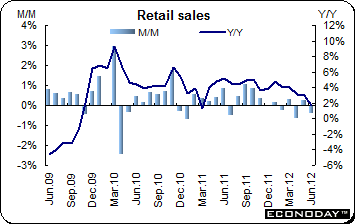 June retail sales declined 0.4 percent on the month after increasing 0.2 percent in May. On the year, sales were up 1.7 percent. Lower sales were reported in 7 of 11 subsectors, representing 64 percent of retail trade. General merchandise store receipts declined 1.5 percent. Store closures contributed to lower sales at department stores (down 2.6 percent). Sales at other general merchandise stores declined 0.6 percent. Gasoline station sales decreased 1.3 percent, reflecting lower prices at the pump. Building material and garden equipment and supplies dealers reported a 2.1 percent sales decline. Sales at motor vehicle and parts dealers decreased 0.4 percent. Gains were reported by used car dealers (up 1.8 percent) and automotive parts, accessories and tire stores (up 0.4 percent). Furniture & home furnishing stores (down 0.5 percent) reported a fifth sales decrease in six months. Food & beverage store receipts were up 0.5 percent. Higher sales at supermarkets & other grocery stores (up 1.0 percent) accounted for most of the increase. Following declines in April and May, sales at electronics & appliance stores rose 1.1 percent in June. June retail sales declined 0.4 percent on the month after increasing 0.2 percent in May. On the year, sales were up 1.7 percent. Lower sales were reported in 7 of 11 subsectors, representing 64 percent of retail trade. General merchandise store receipts declined 1.5 percent. Store closures contributed to lower sales at department stores (down 2.6 percent). Sales at other general merchandise stores declined 0.6 percent. Gasoline station sales decreased 1.3 percent, reflecting lower prices at the pump. Building material and garden equipment and supplies dealers reported a 2.1 percent sales decline. Sales at motor vehicle and parts dealers decreased 0.4 percent. Gains were reported by used car dealers (up 1.8 percent) and automotive parts, accessories and tire stores (up 0.4 percent). Furniture & home furnishing stores (down 0.5 percent) reported a fifth sales decrease in six months. Food & beverage store receipts were up 0.5 percent. Higher sales at supermarkets & other grocery stores (up 1.0 percent) accounted for most of the increase. Following declines in April and May, sales at electronics & appliance stores rose 1.1 percent in June.
The week was relatively quiet on the economic data front with only the flash PMI indexes giving investors a clue on economic growth. The data confirmed the weakness in Europe and China with only the U.S. manufacturing index indicating growth. Investor concerns were elevated as talks on the Greek debt situation picked up.
This week brings a slew of new economic data. However, most investors will be focused on comments from Fed chairman Ben Bernanke and ECB president Mario Draghi at the weekend Jackson Hole, Wyoming conference.
| Central Bank activities |
|
| August 29 |
United States |
Federal Reserve Beige Book |
|
|
|
| The following indicators will be released this week... |
| Europe |
|
|
| August 27 |
Germany |
Ifo Business Survey (August) |
| August 28 |
Eurozone |
M3 Money Supply (July) |
| August 30 |
Eurozone |
Business and Consumer Confidence (August) |
|
Germany |
Unemployment (August) |
|
|
Retail Sales (June) |
| August 31 |
Eurozone |
Harmonized Index of Consumer Prices (August, flash) |
|
|
Unemployment (July) |
|
|
|
| Asia/Pacific |
|
|
| August 30 |
Japan |
Retail Sales (July) |
| August 31 |
Japan |
Household Spending (July) |
|
|
Unemployment Rate (July) |
|
|
Consumer Price Index (July) |
|
|
Industrial Production (July) |
|
|
PMI Manufacturing (August) |
|
|
|
| Americas |
|
|
| August 29 |
Canada |
Industrial Product Price Index (July) |
| August 31 |
Canada |
Gross Domestic Product (Q2.2012) |
|
|
Monthly Gross Domestic Product (June) |
Anne D Picker is the author of International Economic Indicators and Central Banks.
|

